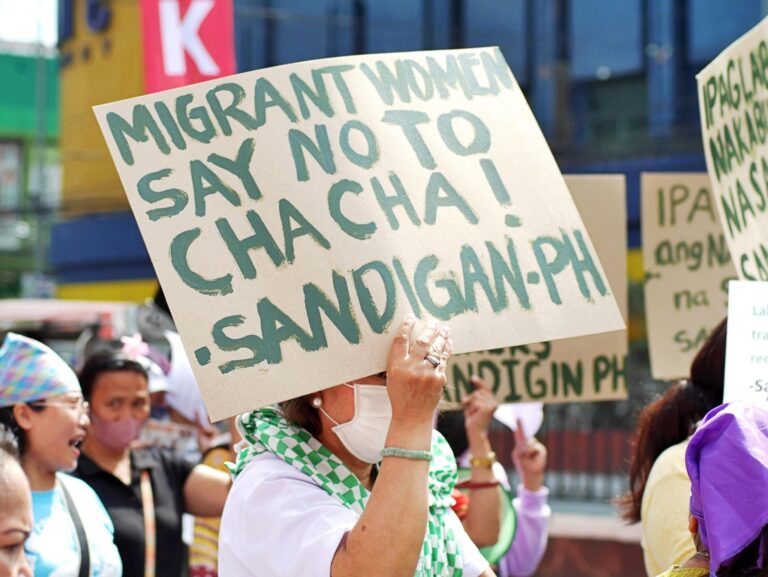
No one knows where this quote came from, but I feel that a woman wrote it: “Here’s to strong women. May we know them. May we be them. May we raise them.” Mabuhay ang ating migranteng kababaihan!
International Working Women’s Day just passed but I would like to hope that the stories of working women, whose lives (and deaths) leave a legacy of inspiration and struggle to all women, should be told, and re-told. I make a loud shout out to our kababayan working women, caregivers and domestic workers, women farm workers, women with “no status” but work as hard as any of us to support and feed their families, women temporary foreign workers, women refugees, single mothers, and elderly migrant women who work and serve their communities.

Migrante Canada released its message on Women’s Day and I would like to share parts of that statement. “We have fellow sisters and workers who dared to fight, backed by the collective strength and support of the organised migrants’ movement and the community of friends and allies. When their just and righteous fight, which seemed impossible or doomed, described as “suntok sa buwan” (Tagalog idiom meaning a punch to the moon) by naysayers, these women proved the naysayers wrong because of the victories, concrete gains, and lessons they achieved and won.
“We name and remember them. Domestic worker Flor Contemplacion was unjustly executed in Singapore in March 1995; her death remains the symbol of government neglect among our overseas migrant workers and provided an impetus to the founding of Migrante International in 1996.Caregiver Juana Tejada wasdenied permanent residency when her second medical exam showed she had cancer, she challenged this decision and fought for the right to stay and changes in the caregiver program up to her last breath on March 8, 2009. In 2010, Canada amended the immigration policy with the “Juana Tejada Law” that meant caregivers applying for PR no longer needed a second medical exam. Domestic worker Leticia Sarmiento never wavered when she testified against her employers for trafficking her to Canada; in 2013, her employers were found guilty, the first conviction in Canada for trafficking under the Immigration and Refugee Protection Act.
“We are proud of migrant worker Herminia Dominguez, who courageously stepped up to represent over 70 of her fellow temporary foreign workers in the $10 million class action lawsuit against their employer Denny’s Restaurants. This first such case in Canada set the precedent that other foreign workers could act as a group to demand their rights as workers in Canada and win! There is migrant worker Evangeline Cayanan who fought for her right and that of her child Mckenna to stay in Canada in the face of a removal order and won. There is migrant worker and mushroom picker Marisol Bobadilla who spoke up at great risk against the unjust working conditions at the farm and the unscrupulous recruitment agency, Link4Staff, Inc involved in trafficking her and several others.
“We give a solidarity shout out to the more than 200 Sheraton Vancouver Airport hotel workers under Unite Here local 40, predominantly women and women of colour, who continue to be on strike close to a year. We continue to support the 71 Del Monte workers under Unifor local 222 in Oshawa, Ontario, mostly women and newcomers, who went on strike, were terminated without notice or severance pay, but who continue to press for their rights and entitlements as workers.
“We have not forgotten [domestic worker] Mary Jane Veloso, and we campaign to bring her home. Arrested in 2010, she now remains on death row in Indonesia, a glaring example of the Marcos’ government’s inaction and abandonment of overseas migrants.
“Our ties and connections as overseas Filipinos, as workers and migrants to the Philippines are strong, never mind how far it is and how long we have been away. Migrant Filipino women remain involved in the care of their families, and the remittances back home never seem to be enough because of rising prices of food and basic services, depressed wages, large scale corruption, and government incompetence and neglect. State exactions and mandatory fees like PhilHealth imposed on migrant workers are forced on the backs of overseas Filipinos and migrant workers; it took the resistance and opposition of migrants against the PhilHealth mandatory scheme to hold it at bay for now.
“…. Marcos Jr’s scheme to amend the Constitution (aka Chacha) …will not put food on the tables of our families back home. Instead, it will open the country to greater foreign ownership and control, strengthen political dynasties even more with the extended terms of office, line government pockets through unbridled corruption, make a mockery of whatever national sovereignty is left, and intensify the economic, social, and political conditions that will continue to drive more Filipino women and men to find work overseas. This scheme must be stopped.”
As a Filipina, I share the dream of our kababayan women of a Filipino society where families are not broken up by the urgent need to survive. Our kababayan women dream, work, and struggle for a Philippines where there is an opportunity for everyone to live a decent and humane life. Those dreams are our dreams as well but the conditions that push an estimated 6,000 women and men to leave the Philippines to work abroad every day, remain and grow worse. This is one of the big reasons why migrant women fight to protect and promote their rights and welfare as workers, but also advance and achieve their demands as women, working alongside the menfolk as equal partners in expanding the progressive movement of overseas Filipinos, and contributing and advancing the movement for social change back home.
Migrante Canada ended its message with the timely call to all Filipino women migrant workers, overseas Filipinos and all its chapters, and member organisations “to unite and work to expose and oppose the Marcos Chacha. The calls for “System change, not Marcos Charter Change,” “Oppose the Marcos Chacha”,” Pagkain sa Mesa, hindi Marcos Chacha” will be loudly heard across Canada and in the Philippines as well.” ###
